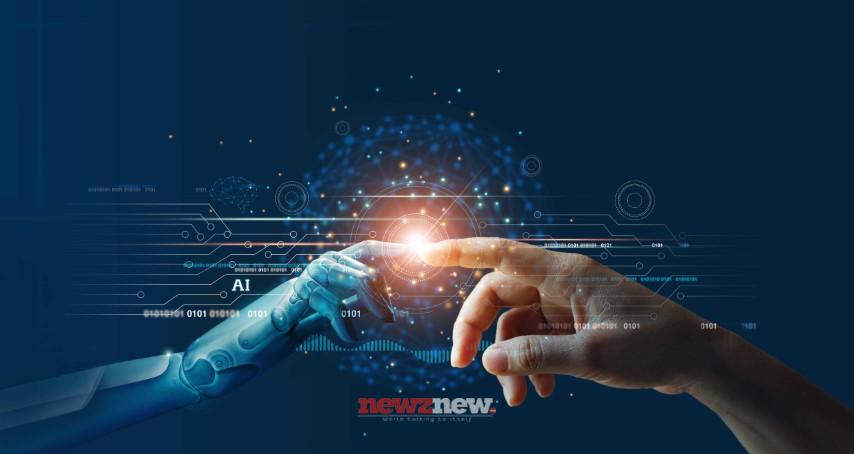AI -vs- Humans: Who Will Win?: AI (Artificial Intelligence) is the simulation of human intelligence processes by machines, specifically computer systems. These processes include learning, reasoning and self-correction.
 AI has been used in countless fields to automate tedious tasks and provide insight into complex problems.
AI has been used in countless fields to automate tedious tasks and provide insight into complex problems.
Humankind’s Greatest Showdown: AI vs. Humans
Human intelligence refers to a range of cognitive skills including creativity, problem solving, decision making and social interaction. It also includes the ability to recognize patterns, learn from experiences and adapt quickly to changing environments.
While both AI and human intelligence have their advantages, it is clear that humans possess unique qualities that cannot be replicated by machines alone.
Pros and Cons of AI
The Benefits of Using AI
AI has revolutionized the way many industries operate. It automates tedious tasks, increases efficiency and reduces costs. Additionally, it can be used to quickly process vast amounts of data for insights that are not readily available to humans.
AI also provides a more accurate representation of reality since its algorithms are based on real-world events and conditions. This allows for better decision making in areas such as healthcare, finance and marketing.
The Risks of Using AI
Though there are numerous advantages to using AI technology, there are risks associated with its use as well. For example, if an algorithm is not programmed correctly or data sets are biased then the results may be inaccurate or unfair decisions could be made regarding people’s lives or services they receive.
In addition, some fear that increased automation will lead to job loss due to machines replacing human labor in certain sectors such as manufacturing or customer service positions. Finally, an increase in autonomous technologies raises concerns about privacy and security issues like cyber attacks by malicious actors who seek access to sensitive information through these systems.
Comparison of AI and Human Intelligence
The Advantages of AI Over Human Intelligence
AI offers numerous advantages over human intelligence in various fields. It is capable of processing complex data at a much faster rate than humans, which makes it ideal for tasks that require high speed and accuracy such as medical diagnoses or financial forecasting. Additionally, AI can be programmed to work autonomously without the need for human supervision.
This means companies can save time and money on labor costs by using AI instead of hiring employees to perform certain functions. Finally, AI algorithms are often more reliable than human judgement due to their consistency and lack of bias when making decisions based on data sets.
The Disadvantages of AI Over Human Intelligence
Though there are many advantages to using artificial intelligence over human intelligence in some areas, there are also disadvantages associated with its use as well. First off, an algorithm’s accuracy is only as good as the data set it’s working from which means if the dataset used is incomplete or inaccurate then any decisions made by an algorithm could be wrong or lead to unintended consequences.
Furthermore, since machines are not creative like humans they cannot come up with novel solutions that may help solve problems more effectively than existing methods do. Finally, since machines lack social interaction capabilities they may not understand how people interact with each other in a given situation which could lead them to make incorrect assumptions about relationships between individuals leading to unfortunate outcomes
AI and Human Collaboration
Humans and Artificial Intelligence (AI) working together present a unique opportunity to leverage the strengths of both types of intelligence. By combining their respective skills, humans and AI can optimize tasks that are difficult or impossible for either one to complete alone.
For instance, human creativity can be used in combination with AI’s data crunching capabilities to come up with innovative solutions to complex problems faster than ever before. Additionally, as AI advances it may even become possible for humans and machines to collaborate on projects directly such as navigating a hazardous environment or responding to an emergency situation.
Despite the potential benefits of working together, there are still challenges involved when attempting to combine human intelligence with artificial intelligence in meaningful ways. One issue is that AI systems need large amounts of training data which might not always be available due practicality or legal reasons.
Furthermore some tasks require nuanced judgement calls which computers have difficulty making reliably without extensive programming from experienced engineers who understand the nuances involved in certain scenarios. Finally there is also a risk that people will over-rely on machine learning algorithms leading them miss out on important information they could have gathered by using their own judgement instead.
Overall, while collaboration between humans and AI presents many opportunities for optimization there are still hurdles that must be overcome before teams composed of both species can work effectively together towards common goals in all kinds of situations.
Real-World Applications
AI in Education: AI has been used to improve the educational experience for both students and teachers. For instance, machine learning algorithms can be used to grade student assignments more quickly and accurately than humans.
Additionally, AI-based personalized learning systems can adapt instruction to individual student’s interests and abilities helping them learn faster. Finally, AI chatbots have been developed that allow students to receive help with coursework or ask general questions without waiting for the teacher’s response.
AI in Healthcare: In healthcare, artificial intelligence is being used increasingly as a tool for diagnosing diseases, analyzing medical images such as x-rays or CT scans and detecting anomalies in patient data sets.
Additionally, it has proven useful in research applications by providing insights into new treatment methods or uncovering correlations between different conditions that would not have otherwise been noticed by humans alone. Furthermore, AI is also being used more frequently as an aid during surgery allowing doctors greater precision when performing delicate procedures like operating on a tumor inside the brain.
Conclusion
The potential benefits of artificial intelligence (AI) to humanity are vast and far-reaching. AI can be used to automate mundane tasks, improve decision making in complex situations, and assist humans in performing activities with greater efficiency.
For instance, AI is being used today to help diagnose diseases more accurately than ever before which has the potential to save lives. Additionally, AI can reduce errors made by humans when handling large data sets or analyzing complex problems thus ensuring that decisions are based on accurate information instead of guesswork.
Furthermore, advancements in natural language processing have enabled machines to better understand and respond to human commands which allows for a much smoother user experience when interacting with computers.
In addition to its practical applications, AI also has the potential ability augment human abilities in ways that were previously unimaginable. For example, robotic prosthetics connected directly into the nervous system could give people superhuman strength or speed; artificial implants could enhance our memory capacity; and machine learning algorithms could provide us with real-time knowledge about any subject imaginable without having studied it extensively beforehand. Such technologies would not only increase our capabilities but also drastically improve quality of life for those who suffer from physical disabilities or illnesses that limit their mobility or cognitive functions.
Overall, while there are many challenges associated with developing reliable Artificial Intelligence technology it is clear that if done so responsibly then such systems can significantly benefit mankind by automating tedious tasks, improving decision making processes and even augmenting human abilities beyond what was once thought possible.






